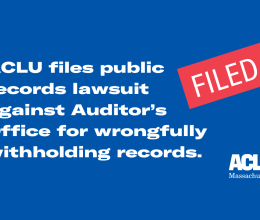
The Northeastern Massachusetts Law Enforcement Council (NEMLEC) has settled a lawsuit brought by the American Civil Liberties Union of Massachusetts and agreed that its records are subject to the state public records law. Today, the parties asked the Suffolk County Superior Court to enter a proposed judgment reflecting that understanding. This effectively ends a dispute that began more than two years ago when NEMLEC initially refused to provide the public with information about its activities. The motion is currently awaiting a judge's approval.
NEMLEC, a group of 61 police and sheriff departments in Middlesex and Essex counties, oversees several operational units and receives government grants and taxpayers' dollars. Its Special Weapons and Tactics (SWAT) team uses armored vehicles, automatic weapons and combat gear to carry out military-style operations, including forced entries into homes to serve search warrants.
In 2012, the ACLU of Massachusetts requested records relating to NEMLEC's SWAT team and other operations as part of its efforts to document regional policing operations and the militarization of police. NEMLEC refused to allow access to those records, claiming that its records were outside the reach of the public records law. The ACLU of Massachusetts filed suit in state court in June of last year to obtain the documents.
NEMLEC ultimately reversed its position and agreed that its records are subject to the public records law. In keeping with its revised position, NEMLEC released more than 900 pages of documents about its activities to the ACLU of Massachusetts, including SWAT team after-action reports, policies, financial statements and training materials. The ACLU of Massachusetts is reviewing the documents and will release them to the public, along with in-depth analysis, shortly.
"We are pleased that NEMLEC and the ACLU of Massachusetts were able to come to an agreement. Today's settlement is a victory for open government and accountability, but there is more work to be done," said ACLU staff attorney Jessie Rossman. "Filing a lawsuit is costly and time consuming. We must reform our public records laws so journalists and members of the public can quickly access public information without hiring lawyers and wasting time and energy on basic transparency. Making records publicly available is just the starting line when it comes to accountability."
Public records lawsuits like this one are rare in the Commonwealth, due in part to the fact that, unlike 47 other states, Massachusetts law does not allow the prevailing party to recover its attorneys' fees. The party that makes the request must cover all of its legal costs in order to enforce the law.
"We have always believed that when it comes to this matter, the law is clear—the records of law enforcement agencies such as NEMLEC are public and subject to disclosure," said Rossman. "But the public records law is so weak that agencies think they can wrongly deny requests and not face any consequences. We shouldn't have been forced to go to court to get access to these documents."
"The public deserves to know what law enforcement agencies are doing in our name," said ACLU of Massachusetts executive director Carol Rose. "We applaud NEMLEC for coming to this understanding and call on other Law Enforcement Councils and similar entities to follow its lead."






